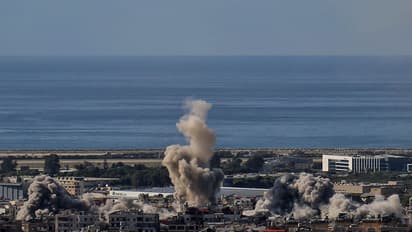Israel strikes Hezbollah rocket depot in first airstrike since ceasefire, cites 'violation' of deal

Synopsis
The Israeli Defense Forces (IDF) on Thursday carried out their first airstrike since the ceasefire went into effect, targeting a Hezbollah rocket facility in southern Lebanon.
(Image for representation purpose; Credit: Getty Images)
The Israeli Defense Forces (IDF) on Thursday carried out their first airstrike since the ceasefire went into effect, targeting a Hezbollah rocket facility in southern Lebanon. The IDF stated that its fighter jets struck the facility after identifying activity that violated the terms of the ceasefire.
The facility, which had been used to store medium-range rockets, was targeted as part of efforts to neutralize the threat posed by Hezbollah. The military emphasized that it remains actively deployed in southern Lebanon and is committed to thwarting any violations of the ceasefire agreement.
According to an IDF spokesperson, the airstrike was a response to the Hezbollah activity detected at the site. “A short time ago, terrorist activity was detected at a facility of the Hezbollah terrorist organization with medium-range rockets in southern Lebanon. The threat was thwarted by a fighter jet attack. The IDF is deployed in southern Lebanon, acting and thwarting any violation of the ceasefire agreement," the IDF said in a post on X.
This airstrike marks the first use of warplanes since the ceasefire began, signaling the IDF's continued vigilance and readiness to respond to threats in the region.
The ceasefire agreement, facilitated by the United States and supported by France, calls for a 60-day cessation of hostilities. Key provisions include Hezbollah retreating 40 kilometers from the Israel-Lebanon border and the deployment of 5,000 Lebanese troops, backed by United Nations peacekeepers, to secure the region. The deal seeks to uphold UN Security Council Resolution 1701, which mandates that the area south of the Litani River remain free of armed fighters other than the Lebanese Army.
US President Joe Biden on Tuesday praised the decision by Lebanon and Israel's leaders to end the violence, stating, "It reminds us that peace is possible."
“Over the next 60 days, Israel will gradually withdraw its remaining forces and civilians on both sides will soon be able to safely return to their communities and begin to rebuild their homes,” the outgoing US president added.
Iran warns Israel after ceasefire deal
Iran’s FM Abbas Araghchi endorsed the US-French-brokered truce stating, "If [the] Lebanese government and Hezbollah are happy with this ceasefire, we are happy too."
"If the Israeli regime wants to… concentrate on Iran, they can try. Of course, we reserve the right to react… but this is not our choice," Araghchi added.
Israeli Prime Minister Benjamin Netanyahu earlier acknowledged the ceasefire but vowed to act against any perceived threats, stating, “If Hezbollah violates the agreement and tries to arm itself, we will attack.”
Also read: Israel-Hezbollah ceasefire deal: Key terms of the agreement brokered by US explained
Lebanon’s caretaker Prime Minister Najib Mikati too welcomed the deal as a step toward regional stability, while Hezbollah expressed conditional approval, emphasizing the importance of preserving Lebanon’s sovereignty.
Hezbollah said it also accepts the proposal and its deputy chair of political council, Mahmoud Qamati, told Al Jazeera that “We want an end to the aggression, of course, but not at the expense of the sovereignty of the state. Any violation of sovereignty is refused.”
Check the Breaking News Today and Latest News from across India and around the world. Stay updated with the latest World News and global developments from politics to economy and current affairs. Get in-depth coverage of China News, Europe News, Pakistan News, and South Asia News, along with top headlines from the UK and US. Follow expert analysis, international trends, and breaking updates from around the globe. Download the Asianet News Official App from the Android Play Store and iPhone App Store for accurate and timely news updates anytime, anywhere.